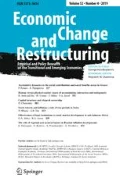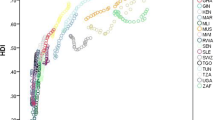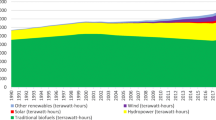Abstract
Energy needs are growing in Africa. The continent is rich in renewable energy resources, and the majority of countries are willing to change their energy regime by moving to the development and increased use of renewable energy. Increasing the share of renewable energy in the total energy mix is one way to improve the quality of economic growth. However, although economic growth has improved in Africa, it has not necessarily translated into sustained poverty reduction and equitable sharing. It is therefore important that the benefits of modern and renewable energy are captured by all. In that perspective, this research aims to explore the potential impact of renewable energy consumption on inclusive growth in 44 African countries. To do this, a dynamic panel data model is estimated with the System Generalized Method of Moments for a period covering 1991–2015. Focusing on inclusive growth that increases the size of the economy and creates employment opportunities for different segments of society, the main finding of the study is that renewable energy consumption has a significant positive impact on inclusive growth in Africa, particularly in African countries experiencing low levels of inclusive growth. Thus, if African countries succeed in making the transition to renewable energy effective, then incredible gains in inclusive growth could be captured, especially in countries with low levels of inclusive growth.

Source: Author, based on WDI and SE4ALL database

Source: Author, based on WDI database
Similar content being viewed by others
Notes
See, for example, the solar park of Benban in Egypt which is one of the most important and complex energy projects under development on the continent. Once completed, it will be the largest solar installation in the world.
Goal 8: Promote sustained, inclusive and sustainable economic growth, full and productive employment and decent work for all.
Index measuring income inequality: a value of 100 corresponds to high inequality, and a value of 0 corresponds to low inequality.
AUC: African Union Commission; OECD: Organization for Economic Co-operation and Development.
For more definition, See Ngepah (2017) who conducted a broad review of theories and evidence of inclusive growth from the perspective of African countries.
Endogeneity refers to the correlation between the independent variables and the error terms. It could arise in the following cases: the presence of the lagged dependent variable among the regressors, measurement error or omitted variables bias.
Here, Type 1 error refers to the risk of rejecting a true null hypothesis of non-significance of the estimated coefficients.
Based on our measure of inclusive growth, inclusive growth would be high in a country for greater values of GDP per person employed. Nevertheless, we recognized that this may not be without limitations.
References
AfDB (2019) African Economic Outlook 2019. p 214
Ahn S, Schmidt P (1995) Efficient estimation of models for dynamic panel data. J Econom 68(1):5–27
Apergis N, Payne JE (2010) Renewable energy consumption and growth in Eurasia. Energy Econ 32:1392–1397
Apergis N, Payne JE (2011) On the causal dynamics between renewable and non-renewable energy consumption and economic growth in developed and developing countries. Energy Syst 2:299–312
Arellano M, Bond S (1991) Some tests of specification for panel data: Monte Carlo evidence and application to employment equations. Rev Econ Stud 58(2):277–297
AUC/OECD (2018) Africa's Development Dynamics: growth, jobs and inequalities. AUC, Addis Ababa/OECD, Paris. https://doi.org/10.1787/9789264302501-en
Aydin M (2019) Renewable and non-renewable electricity consumption–economic growth nexus: evidence from OECD countries. Renewable Energy 136:599–606
Bai J (2009) Panel data models with interactive fixed effects. Econometrica 77(4):1229–1279
Beegle K, Christiaensen L (2019) Accelerating poverty reduction in Africa. World Bank, Washington, DC. https://openknowledge.worldbank.org/handle/10986/32354
Bhat JA (2018) Renewable and non-renewable energy consumption impact on economic growth and CO2 emissions in five emerging market economies. Environ Pollut Res 25:35515–35530
Bhattacharya M, Paramati SR, Ozturk I, Bhattacharya S (2016) The effect of renewable energy consumption on economic growth: evidence from top 38 countries. Appl Energy 162:733–741
Blundell R, Bond S (1998) Initial conditions and moment restrictions in dynamic panel data models. J Econom 87:115–143
Bond S (2002) Dynamic panel data models: a guide to micro data methods and practice. Port Econ J 1:141–162
Bond S, Hoeffler A, Temple J (2001) GMM estimation of empirical growth models. CEPR discussion paper no. 3048
Charfeddine L, Kahia M (2019) Impact of renewable energy consumption and financial development on CO2 emissions and economic growth in the MENA region: a panel vector autoregressive (PVAR) analysis. Renewable Energy 139:198–213
da Silva PP, Cerqueira PA, Ogbe W (2018) Determinants of renewable energy growth in Sub-Saharan Africa: evidence from panel ARDL. Energy 156:45–54
Dinda S (2011) Inclusive growth through creation of human and social capital. MPRA paper No. 63953
Dutta N, Mukherjee D (2018) Can financial development enhance transparency? Econ Chang Restructuring 51(4):279–302
Eggoh JC (2009) Croissance économique et développement financier: éléments d’analyse théorique et empirique. Doctoral dissertation, Orléans
Esso LJ (2012) Re-examining the saving-investment nexus: threshold cointegration and causality evidence from the ECOWAS. Econ Change Restruct 45:193–220. https://doi.org/10.1007/s10644-011-9115-y
Hadi A (1992) Identifying multiple outliers in multivariate data. J Roy Stat Soc B 54:761–771
Hadi A (1994) A modification of a method for the detection of outliers in multivariate samples. J Roy Stat Soc B 56:393–396
Hur S-K (2014) Government spending and inclusive growth in developing Asia. Asian Development Bank economics working paper series, 415
Inglesi-Lotz R (2016) The impact of renewable energy consumption to economic growth: a panel data application. Energy Econ. https://doi.org/10.1016/j.eneco.2015.01.003
IRENA (2018) Renewable energy and jobs-annual review 2018. International Renewable Energy Agency, Abu Dhabi
Kahia M, Aïssa MS, Lanouar C (2017) Renewable and non-renewable energy use-economic growth nexus: the case of MENA net oil importing countries. Renew Sustain Energy Rev 71:127–140
Koçak E, Şarkgüneşi A (2017) The renewable energy and economic growth nexus in black sea and Balkan countries. Energy Policy 100:51–57
Kumah FY, Sandy M (2013) In search of inclusive growth: the role of economic institutions and policy. Mod Econ 4:758–775
Maji IK (2015) Does clean energy contribute to economic growth? Evidence from Nigeria. Energy Rep 1:145–150
Maji IK, Sulaiman C, Abdul-Rahim A (2019) Renewable energy consumption and economic growth nexus: a fresh evidence from West Africa. Energy Reports 5:384–392
Masera D, Faaij A (2014) Renewable energy for inclusive and sustainable industrial development. In: The case of biomass gasification. UNIDO, p 44
Mehrhoff J (2009) A solution to the problem of too many instruments in dynamic panel data GMM. Deutsche Bundesbank Discussion Paper Series 1: Economic Studies No 31/2009
Nelson S, Kuriakose AT (2017) Gender and renewable energy: entry points for women’s livelihoods and employment. Climate Investment Funds
Ngepah N (2017) A review of theories and evidence of inclusive growth: an economic perspective for Africa. Curr Opin Environ Sustain 24:52–57
Omri A, Mabrouk NB, Sassi-Tmar A (2015) Modeling the causal linkages between nuclear energy, renewable energy and economic growth in developed and developing countries. Renew Sustain Energy Rev 42:1012–1022
Oyinlola MA, Adedeji A (2019) Human capital, financial sector development and inclusive growth in Sub-Saharan Africa. Econ Change Restruct 52(1):43–66. https://doi.org/10.1007/s10644-017-9217-2
Ozcan B, Ozturk I (2019) Renewable energy consumption-economic growth nexus in emerging countries: a bootstrap panel causality test. Renew Sustain Energy Rev 104:30–37
Ozturk I (2010) A literature survey on energy–growth nexus. Energy Policy 38:340–349
ISPY (2018) An African energy industry report: 2018. ISPY Publishing Limited, Bolton
Raheem ID, Isah KO, Adedeji AA (2018) Inclusive growth, human capital development and natural resource rent in SSA. Econ Change Restruct 51:29–48
Rahman MM, Velayutham E (2020) Renewable and non-renewable energy consumption-economic growth nexus: new evidence from South Asia. Renew Energy 147(1):399–408
Rasoulinezhad E, Saboori B (2018) Panel estimation for renewable and non-renewable energy consumption, economic growth, CO2 emissions, the composite trade intensity, and financial openness of the commonwealth of independent states. Environ Pollut Res 25:17354–17370
Rauniyar G, Kanbur R (2009) Inclusive growth and inclusive development: a review and synthesis of Asian Development Bank literature. Asian Dev Bank Occas Pap 8:15
Roodman D (2009) A note on the theme of too many instruments. Oxford Bull Econ Stat 71(1):135–158
Saidi K, Mbarek MB (2016) Nuclear energy, renewable energy, CO2 emissions, and economic growth for nine developed countries: evidence from panel Granger causality tests. Progress in Nuclear Energy 88:364–374
Schwerhoff G, Sy M (2017) Financing renewable energy in Africa—key challenge of the sustainable development goals. Renew Sustain Energy Rev 75:393–401
Shahbaz M, Loganathan N, Zeshan M, Zaman K (2015) Does renewable energy consumption add in economic growth? An application of auto-regressive distributed lag model in Pakistan. Renew Sustain Energy Rev 44:576–585
Solow R (1956) A contribution to theory of economic growth. Q J Econ 70(1):65–94
Sweerts B, Longa FD, van der Zwaan B (2019) Financial de-risking to unlock Africa’s renewable energy potential. Renew Sustain Energy Rev 102:75–82
Vural G (2020) Renewable and non-renewable energy-growth nexus: a panel data application for the selected Sub-Saharan African countries. Resour Policy 65:101568
Windmeijer F (2005) A finite sample correction for the variance of linear efficient two-step GMM estimators. J Econom 126(1):25–51
Acknowledgements
I am grateful to anonymous referees for their helpful comments and suggestions that contributed to significantly enhancing the final version of the paper. The usual disclaimer applies.
Author information
Authors and Affiliations
Corresponding author
Additional information
Publisher's Note
Springer Nature remains neutral with regard to jurisdictional claims in published maps and institutional affiliations.
Appendices
Appendix 1
See Fig. 3.
Appendix 2
See Fig. 4.
Appendix 3
See Fig. 5.
Appendix 4: Countries used in the study
Algeria, Angola, Benin, Botswana, Burkina Faso, Burundi, Cabo Verde, Cameroon, Central African Republic, Chad, Congo Dem. Rep., Congo Rep., Cote d’Ivoire, Djibouti, Egypt, Equatorial Guinea, Eritrea, Eswatini, Ethiopia, Gabon, Gambia, Ghana, Guinea, Guinea-Bissau, Kenya, Lesotho, Madagascar, Malawi, Mali, Mauritania, Mauritius, Morocco, Mozambique, Namibia, Rwanda, Senegal, Sierra Leone, South Africa, Sudan, Tanzania, Togo, Tunisia, Uganda, Zambia.
Rights and permissions
About this article
Cite this article
Kouton, J. The impact of renewable energy consumption on inclusive growth: panel data analysis in 44 African countries. Econ Change Restruct 54, 145–170 (2021). https://doi.org/10.1007/s10644-020-09270-z
Received:
Accepted:
Published:
Issue Date:
DOI: https://doi.org/10.1007/s10644-020-09270-z







